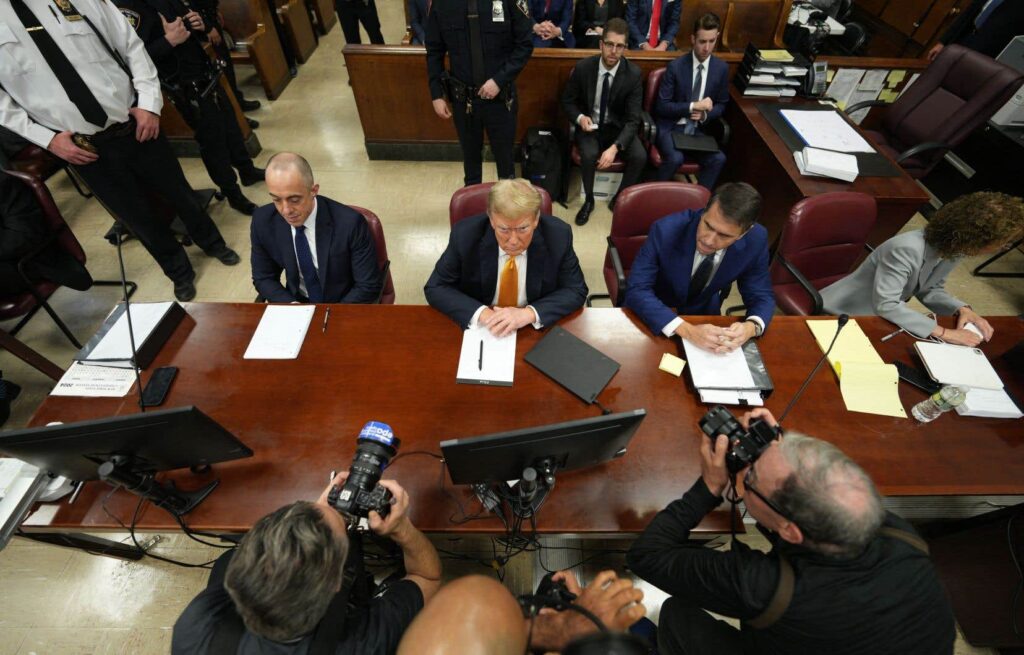Donald Trump’s lawyers have given up on having him testify at his trial in New York for concealed payments and have finished presenting their defense.
Mr. Trump’s team concluded with testimony from a former federal prosecutor who had been called to attack the credibility of the prosecution’s key witness — one of only two witnesses called to the stand by the defense. The Manhattan district attorney’s office called 20 witnesses over 15 days before resting its case on Monday.
The jury was sent home for a week, until Tuesday, May 28, when closing arguments are expected. But attorneys were expected to return to the courtroom later Tuesday to discuss how the judge will instruct jurors about their upcoming deliberations.
Mr. Trump, the first former US president to face criminal trial, has pleaded not guilty and denied any wrongdoing in the case, which he has called a witch hunt by his political opponents.
He had previously said he wanted to testify in his own defense, but was under no obligation to do so, nor was he expected to do so. It is quite usual for defendants to refuse to testify.
His lawyers, instead of making efforts to demonstrate Mr. Trump’s innocence to jurors, focused on the credibility of the prosecution’s witnesses. This is a common defense strategy because the burden of proof in a criminal case falls on the prosecution. The defense has nothing to prove.
Yet even as Mr. Trump describes the trial as a travesty of justice driven by political partisanship, he has sought to make the proceedings an offshoot of his presidential campaign. He used the trial to raise money, used his time in front of the cameras to criticize President Joe Biden and fronted a parade of his own political supporters.
Covering Up Embarrassing Affairs
After more than four weeks of testimony, jurors could begin deliberating as early as next week to decide whether Mr. Trump is guilty of 34 counts of falsifying corporate financial records.
Prosecutors accuse the ex-president and likely Republican presidential candidate of paying to bury embarrassing cases as part of an illegal attempt to influence the results of the 2016 presidential election. He allegedly falsified records financial institutions to hide payments.
There would be absolutely no reason, no justification to do so: everyone sees (this trial) as a sham.
Mr. Trump has pleaded not guilty and denied any wrongdoing. This is the first of four criminal cases to go to trial, and likely the only one before the 2024 presidential election. “They have no case,” Mr. Trump reiterated Tuesday morning before the work is lifted. “There is no crime. »
As he left a press briefing with supporters of the ex-president in front of the courthouse on Tuesday, Donald Trump Jr., son of the accused, defended his father’s decision not to testify. “There would be absolutely no reason, no justification to do it: everyone sees (this trial) as a sham,” declared the young Trump.
Jurors received a lesson during the trial about the underbelly of the tabloid business world, where Mr. Trump’s allies within the National Enquirer launched a plan to hide the sordid, sometimes scandalous, stories about the billionaire from the public by paying tens of thousands of dollars to buy silence. They saw a porn actress, Stormy Daniels, recount in great detail a sexual encounter she allegedly had with Mr. Trump in a hotel room. The accused assures that nothing sexual happened between them.
Jurors sat attentively in their boxes as Mr. Trump’s former lawyer and right-hand man, Michael Cohen, now his nemesis, placed the former president at the center of the scheme to buy the Stormy Daniels story for prevent it from becoming public, put in place while the Republicans were already trying to disentangle themselves from the fallout from the famous recording ofAccess Hollywood.
But the crux of the prosecution’s case lies not in the spectacle, but in the business dealings, including the Trump Organization’s internal records in which payments made to Mr.e Cohen were falsely listed as “legal fees.” The prosecution argued that these expenses were in reality reimbursements spread out to Me Cohen, for a $130,000 payment he made on behalf of Mr. Trump to silence Stormy Daniels.
Mr. Trump was indicted on 34 counts of falsifying business records.
Last defense witness
The second and final defense witness was Robert Costello, called to the stand in an attempt to undermine Mr. Cohen’s credibility. The two men had a professional relationship that broke down spectacularly. During his testimony Monday, he angered the judge by rolling his eyes and speaking in a low voice. The judge evacuated the courtroom and threatened to evict the man if he did not respect further decorum.
Mr. Costello contradicted testimony from Michael Cohen who described Mr. Trump as being intimately involved in all aspects of the secret payment scheme. Mr. Costello told jurors on Monday that Mr. Cohen told him that Mr. Trump “knew nothing” about the secret payment made to Ms.me Daniels.
But Mr. Cohen said earlier on Monday that he had “no doubt” that Mr. Trump had given him final approval to make the payments to Stormy Daniels. He said he spoke with Trump more than 20 times about the matter in total as of October 2016.
Judge Juan Merchan has yet to rule on the defense’s request to drop the charges before jurors even begin deliberating, which is based on the argument that prosecutors failed to prove their cause. The defense suggested that Mr. Trump was trying to protect his family, not his campaign, by suppressing what he considers to be false claims.
Such motions to stay proceedings are often made in criminal cases, but they are rarely granted.

